Intellectual history is the study of the history of human thought and of intellectuals, people who conceptualize, discuss, write about, and concern themselves with ideas. The investigative premise of intellectual history is that ideas do not develop in isolation from the thinkers who conceptualize and apply those ideas; thus the intellectual historian studies ideas in two contexts: (i) as abstract propositions for critical application; and (ii) in concrete terms of culture, life, and history.
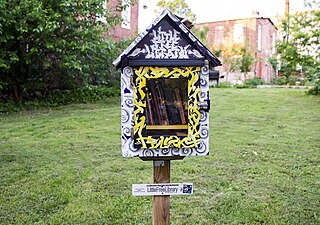
The sociology of knowledge is the study of the relationship between human thought, the social context within which it arises, and the effects that prevailing ideas have on societies. It is not a specialized area of sociology. Instead, it deals with broad fundamental questions about the extent and limits of social influences on individuals' lives and the social-cultural basis of our knowledge about the world. The sociology of knowledge has a subclass and a complement. Its subclass is sociology of scientific knowledge. Its complement is the sociology of ignorance.

Sir Isaiah Berlin was a Russian-British social and political theorist, philosopher, and historian of ideas. Although he became increasingly averse to writing for publication, his improvised lectures and talks were sometimes recorded and transcribed, and many of his spoken words were converted into published essays and books, both by himself and by others, especially his principal editor from 1974, Henry Hardy.

Giambattista Vico was an Italian philosopher, rhetorician, historian, and jurist during the Italian Enlightenment. He criticized the expansion and development of modern rationalism, finding Cartesian analysis and other types of reductionism impractical to human life, and he was an apologist for classical antiquity and the Renaissance humanities, in addition to being the first expositor of the fundamentals of social science and of semiotics. He is recognised as one of the first Counter-Enlightenment figures in history.
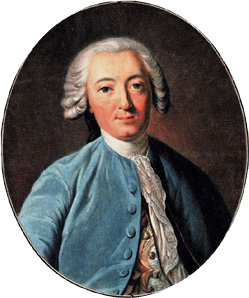
Claude Adrien Helvétius was a French philosopher, freemason and littérateur.

Joseph Marie, comte de Maistre was a Savoyard philosopher, writer, lawyer, and diplomat who advocated social hierarchy and monarchy in the period immediately following the French Revolution. Despite his close personal and intellectual ties with France, Maistre was throughout his life a subject of the Kingdom of Sardinia, which he served as a member of the Savoy Senate (1787–1792), ambassador to Russia (1803–1817), and minister of state to the court in Turin (1817–1821).

Johann Georg Hamann was a German Lutheran philosopher from Königsberg known as "the Wizard of the North" who was one of the leading figures of post-Kantian philosophy. His work was used by his student J. G. Herder as the main support of the Sturm und Drang movement, and is associated with the Counter-Enlightenment and Romanticism.

Johann Gottfried von Herder was a German philosopher, theologian, poet, and literary critic. He is associated with the Enlightenment, Sturm und Drang, and Weimar Classicism. He was a Romantic philosopher and poet who argued that true German culture was to be discovered among the common people. He also stated that it was through folk songs, folk poetry, and folk dances that the true spirit of the nation was popularized.
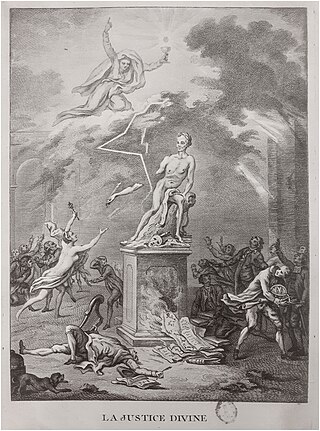
The Counter-Enlightenment refers to a loose collection of intellectual stances that arose during the European Enlightenment in opposition to its mainstream attitudes and ideals. The Counter-Enlightenment is generally seen to have continued from the 18th century into the early 19th century, especially with the rise of Romanticism. Its thinkers did not necessarily agree to a set of counter-doctrines but instead each challenged specific elements of Enlightenment thinking, such as the belief in progress, the rationality of all humans, liberal democracy, and the increasing secularisation of society.

Georges Eugène Sorel was a French social thinker, political theorist, historian, and later journalist. He has inspired theories and movements grouped under the name of Sorelianism. His social and political philosophy owed much to his reading of Proudhon, Karl Marx, Giambattista Vico, Henri Bergson, and later William James. His notion of the power of myth in collective agency inspired socialists, anarchists, Marxists, and fascists. Together with his defense of violence, the power of myth is the contribution for which he is most often remembered.

Metahistory: The Historical Imagination in Nineteenth-century Europe is a work of historiography by Hayden White first published in 1973. On the second page of his introduction, White stated:
My own analysis of the deep structure of the historical imagination of Nineteenth century Europe is intended to provide a new perspective on the current debate over the nature and function of historical knowledge.
Classical republicanism, also known as civic republicanism or civic humanism, is a form of republicanism developed in the Renaissance inspired by the governmental forms and writings of classical antiquity, especially such classical writers as Aristotle, Polybius, and Cicero. Classical republicanism is built around concepts such as liberty as non-domination, self-government, rule of law, property-based personality, anti-corruption, abolition of monarchy, civics, civil society, common good, civic virtue, popular sovereignty, patriotism and mixed government.
In ethics, value pluralism is the idea that there are several values which may be equally correct and fundamental, and yet in conflict with each other. In addition, value-pluralism postulates that in many cases, such incompatible values may be incommensurable, in the sense that there is no objective ordering of them in terms of importance. Value pluralism is opposed to value monism, which states that all other forms of value can be commensured with or reduced to a single form.
Mark Lilla is an American political scientist, historian of ideas, journalist, and professor of humanities at Columbia University in New York City. A self-described liberal, he frequently, though not always, presents views from that perspective.
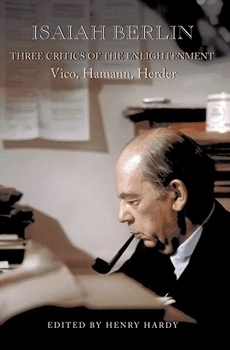
Three Critics of the Enlightenment: Vico, Hamann, Herder is a collection of essays in the history of philosophy by 20th century philosopher and historian of ideas Isaiah Berlin. Edited by Henry Hardy and released posthumously in 2000, the collection comprises the previously published works Vico and Herder: Two Studies in the History of Ideas (1976) – an essay on Counter-Enlightenment thinkers Giambattista Vico and Johann Gottfried Herder – and The Magus of the North: J. G. Hamann and the Origins of Modern Irrationalism (1993), concerning irrationalist Johann Georg Hamann.
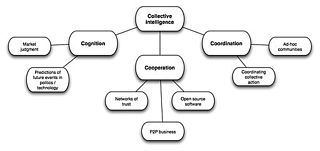
Common sense is sound, practical judgement concerning everyday matters, or a basic ability to perceive, understand, and judge in a manner that is shared by nearly all people.

Over the ages, Italian philosophy had a vast influence on Western philosophy, beginning with the Greeks and Romans, and going onto Renaissance humanism, the Age of Enlightenment and modern philosophy. Philosophy was brought to Italy by Pythagoras, founder of the school of philosophy in Crotone, Magna Graecia. Major philosophers of the Greek period include Xenophanes, Parmenides, Zeno, Empedocles and Gorgias. Roman philosophers include Cicero, Lucretius, Seneca the Younger, Musonius Rufus, Plutarch, Epictetus, Marcus Aurelius, Clement of Alexandria, Sextus Empiricus, Alexander of Aphrodisias, Plotinus, Porphyry, Iamblichus, Augustine of Hippo, Philoponus of Alexandria and Boethius.

The New Science is the major work of Italian philosopher Giambattista Vico. It was first published in 1725 to little success, but has gone on to be highly regarded and influential in the philosophy of history, sociology, and anthropology. The central concepts were highly original and prefigured the Age of Enlightenment.
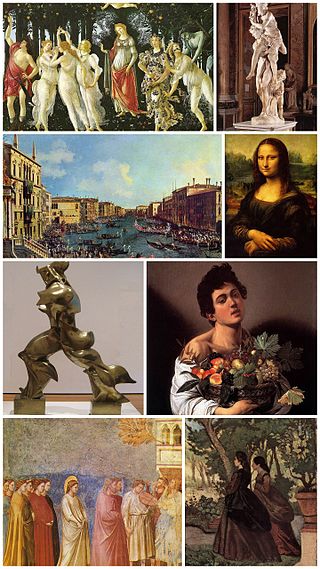
The 1700s refers to a period in Italian history and culture which occurred during the 18th century (1700–1799): the Settecento. The Settecento saw the transition from Late Baroque to Neoclassicism: great artists of this period include Vanvitelli, Canaletto and Canova, as well as the composer Vivaldi and the writer Goldoni.

The Enlightenment in Italy was a cultural and philosophical movement that began in the second half of the eighteenth century, characterized by the discussion of the epistemological, ethical, and political issues of the Enlightenment thought of the eighteenth century.
















